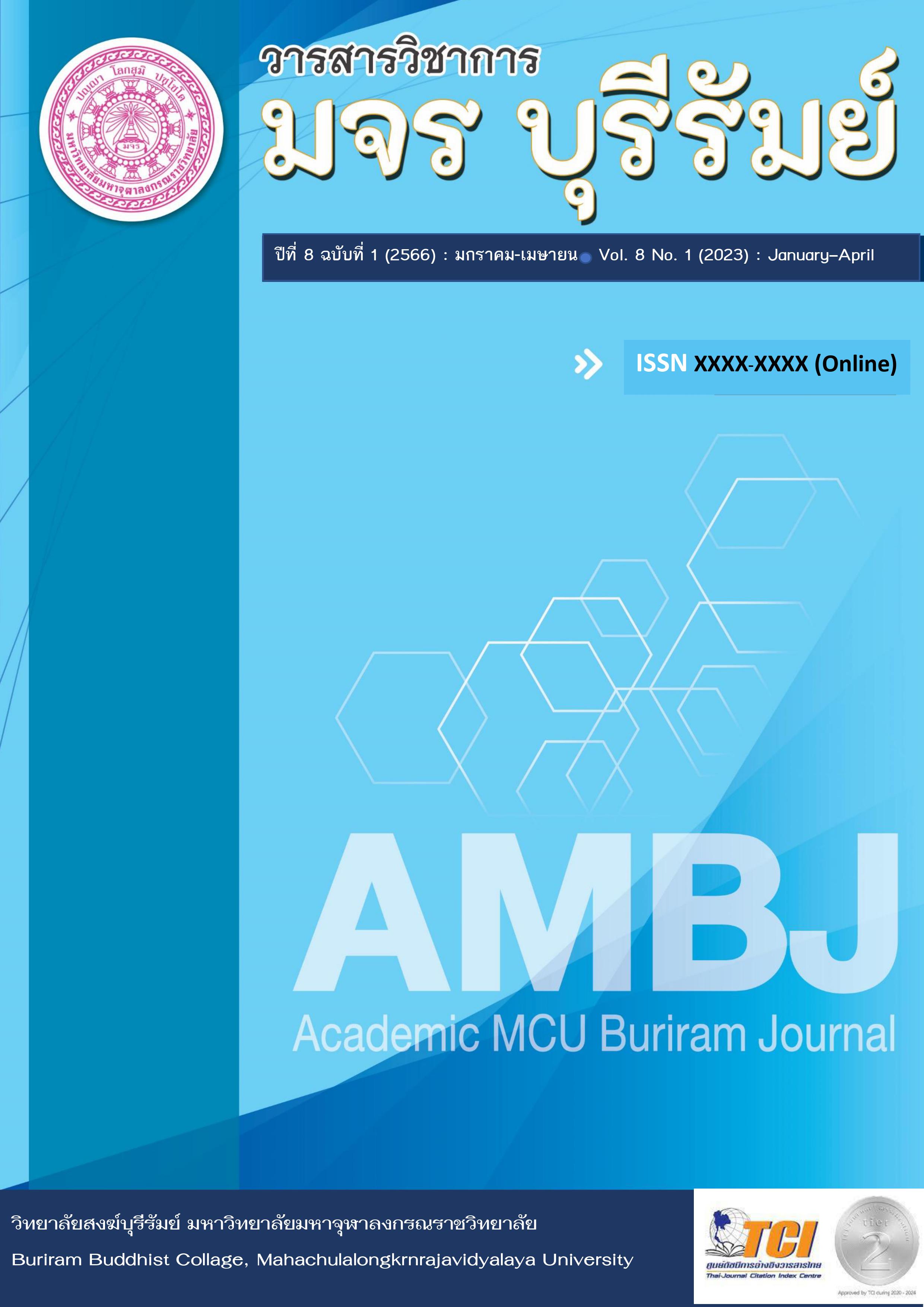A Comparative Study of the Five Anuvratas in Jain Philosophy and the Five Precepts in Theravada Buddhist Philosophy
Keywords:
Five Anuvratas, Jain Philosophy, Five Precepts, Theravada Buddhist PhilosophyAbstract
The research article on “A Comparative Study of the Five Anuvratas in Jain Philosophy and the Five Precepts in Theravada Buddhist Philosophy. It has 3 main objectives: 1) To study the Five Anuvratas in Jain philosophy; 2) To study the Five Precepts in Theravada Buddhist philosophy; 3) Comparative Study of the Five Anuvratas in Jain Philosophy and the Five Precepts in Theravada Buddhist Philosophy. This is a qualitative research by studying the Tripitaka Buddhist scriptures related papers and the data was research which analyzed the data by descriptive methods.
The research result found that:
There are five anuvratas in Jain philosophy that are the primary practice of Jainism in avoiding bad things: 1) Ahimsa; abstaining from persecution; 2) Satya; abstaining from lying; 3) Asteya; abstaining from stealing 4) Brahmacariya; abstaining from sensual pleasures 5) Aparigagaha; abstaining from covetousness, the five great teachings, or the five anuvratas, or these five declarations, if It is a practice for monks called the 5 Maha Vrata, but for the householder it is called five anuvratas, which is to be relieved in the 4th verse, which is to reduce the practice of celibacy that is to abstain from sexual intercourse reduced to just abstaining from sexual misconduct with women or man other than his wife or husband and abstaining from co-existing with prostitutes.
There are 5 precepts in Theravada Buddhist philosophy that are the primary practice of Buddhists: 1) Panatipata Veramani, abstaining from killing, 2) Adinnadana Veramani abstaining from stealing, 3) Kamesu Micchajara Veramanee: intention to refrain from sexual misconduct, 4) Musavada Veramani: intention to refrain from telling lies, 5) Surameyamajjapamadatthana Veramani: intention to refrain from intoxication.
Jainism and Theravada Buddhist Philosophy When compared, it can be seen that the five anuvratas and the five precepts, which is the first anuvrata, abstaining from persecution and the first precept, are the same, that is, abstaining from killing living beings; the second anuvrata and the fourth precept are the same, namely abstaining from lying; the third anuvrata, abstaining from stealing, and the second precept; they are the same; the fourth anuvrata, namely abstaining from sensual pleasures and the third precept, they are the same, namely abstaining from sexual misconduct. The fifth Anuvratas, abstaining from covetousness and the fifth precept abstaining from drinking intoxicating liquor, There are difference. Therefore the five anuvratas and the five precepts are the universal principles of human conduct to create peace in the coexistence of people in society and not allowing people in that society to encroach upon each other's lives and property.
References
นงเยาว์ ชาญณรงค์. (2542). ปรัชญาอินเดีย. พิมพ์ครั้งที่ 2. กรุงเทพมหานคร: สำนักพิมพ์มหาวิทยาลัยรามคำแหง.
บุญมี แท่นแก้ว. (2541). ปรัชญา. พิมพ์ครั้งที่ 3. กรุงเทพมหานคร: สำนักพิมพ์โอเดียนสโตร์.
ประยงค์ แสนบุราณ. (2547). ปรัชญาอินเดีย. กรุงเทพมหานคร: สำนักพิมพ์โอเดียนสโตร์.
มหาจุฬาลงกรณราชวิทยาลัย. (2535). พระไตรปิฎกภาษาบาลี ฉบับมหาจุฬาเตปกํ 2500. กรุงเทพมหานคร: โรงพิมพ์มหาจุฬาลงกรณมหาวิทยาลัย.
มหาจุฬาลงกรณราชวิทยาลัย. (2539). พระไตรปิฎกภาษาไทย ฉบับมหาจุฬาลงกรณราชวิทยาลัย.กรุงเทพมหานคร: โรงพิมพ์มหาจุฬาลงกรณราชวิทยาลัย.
สุชีพ ปุญญานุภาพ. (2540). ศาสนาเปรียบเทียบ. พิมพ์ครั้งที่ 4. กรุงเทพมหานคร: โรงพิมพ์มหามกุฏราชวิทยาลัย.
สุนทร ณ รังษี. (2545). ปรัชญาอินเดียประวัติและลัทธิ. พิมพ์ครั้งที่ 3. กรุงเทพมหานคร: สำนักพิมพ์แห่งจุฬาลงกรณ์มหาวิทยาลัย.
อุดม บัวศรี. (2543). ปรัชญาศาสนา. ขอนแก่น: โรงพิมพ์มหาวิทยาลัยธรรมศาสตร์.
Downloads
Published
How to Cite
Issue
Section
License
Copyright (c) 2023 Academic MCU Buriram Journal

This work is licensed under a Creative Commons Attribution-NonCommercial-NoDerivatives 4.0 International License.
ทัศนะและความคิดเห็นที่ปรากฏในบทความวารสารฉบับนี้ถือเป็นความรับผิดชอบของผู้เขียนบทความนั้น ไม่ถือเป็นทัศนะและความรับผิดชอบของบรรณาธิการ





